Growing garlic is easy and satisfying, as you get fresh garlic without having to buy them. Besides, growing garlic in your garden reduces your budget. But, what to do if garlic doesn’t sprout out? Let’s find it out.
Garlic will not sprout if they are not treated and stored well, or the clove is rotten, leaked, eaten up, or infested with pests and diseases. Sometimes, harsh weather conditions are also responsible for garlic not sprouting. The soil temperature should be between 40-50°F for initial growth.
If the cloves have firm roots, be patient to see them sprout. However, there are many things to know about sprouting garlic. Today, we will share the reasons behind garlic not sprouting and what should be done.
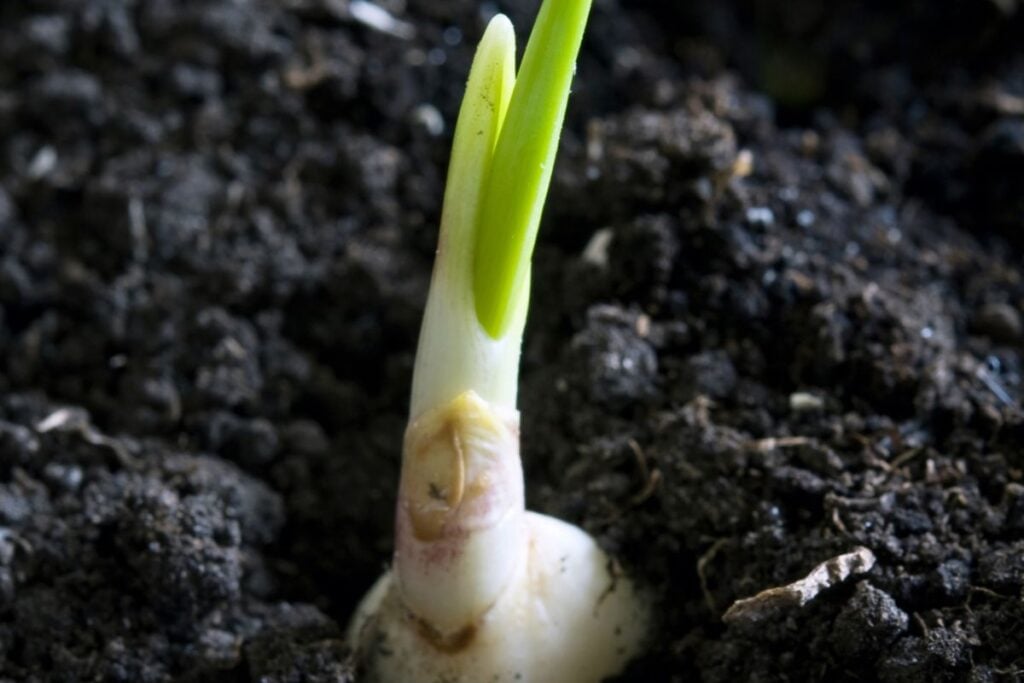
Why is my garlic not sprouting?
If treated well, there is a 95% chance of garlic sprouting.
We always think we have done everything right, taken good care, and had healthy cloves.
But, there are some issues that the cloves might face.
It could be a clove problem, or we have unknowingly done something wrong for which the cloves aren’t sprouting.
Now, let’s find out the reasons behind garlic not sprouting.
Not giving time to grow
Garlic requires at least 4-8 weeks or even more to sprout out, depending on the variety and climatic conditions.
Garlic does not grow well in the late winter or early spring.
Only garlic growing in the south will grow during the winter.
The roots grow in the fall and winter.
Generally, garlic germinates and sprouts in the spring.
If it does not sprout, dig the soil and check the cloves to understand its growth progress.
If the cloves have formed firm roots, don’t worry.
Give it some time to progress more.
Since they have already grown strong roots, the garlic cloves will sprout out without fail.
Also read: When Is Garlic Ready To Harvest? (+How To)
Rotten clove
If a clove has no roots yet and has become soft and mushy, the clove is probably rotten.
First, check the soil to understand the issue.
The clove rotted due to high moisture levels if the soil was wet for a long time.
Either the soil was heavy, or you watered too often without letting the top few inches of the soil dry out.
Garlic requires well-drained, loose, moisture-retentive, and well-aerated soil.
The soil should remain moist, but you must let at least the top 1-2 inches of the soil dry before the next watering.
Avoid watering in winters because garlic stays dormant, and a dormant plant does not require water.
If the soil and watering are right, there might be other issues.
Looking for gardening supplies? We have tested 100's of products before recommending them to you guys. Check out our best pick below:
| Image | Gardening Supplies | Best Price? |
|---|---|---|
 Top
Top Top
Top | Raised Garden Bed Kit | Check On Amazon |
 | XLUX Soil Moisture Meter, Plant Water Monitor, Soil Hygrometer Sensor for Gardening, Farming, Indoor and Outdoor Plants, No Batteries Required | No Results |
 Top
Top Top
Top | 82 Pcs Garden Tools Set and Extra Succulent Tools Set | Check On Amazon |
 | Joeys Garden Expandable Garden Hose with 8 Function Hose Nozzle, Lightweight Anti-Kink Flexible Garden Hoses, Extra Strength Fabric with Double Latex Core, (50 FT, Black) | No Results |
 Top
Top Top
Top | Dual Chamber Compost Tumbler | Check On Amazon |
 Top
Top Top
Top | Sunnyglade Plant Stakes | Check On Amazon |
 Top
Top Top
Top | Organic Cold Pressed Neem Seed Oil | Check On Amazon |
 Top
Top Top
Top | Mighty Mint Gallon :-Insect and Pest Control Peppermint Oil | Check On Amazon |
 Top
Top Top
Top | Scotts DiseaseEx Lawn Fungicide | Check On Amazon |
 Top
Top Top
Top | Jacks Classic 20-20-20 All Purpose Fertilizer | Check On Amazon |
 Top
Top Top
Top | 30,000 Seeds Pollinator Attracting Wildflower Mixture | Check On Amazon |
 Top
Top Top
Top | Survival Vegetable Seeds Garden Kit-Over 16,000 Seeds | Check On Amazon |
Weather conditions
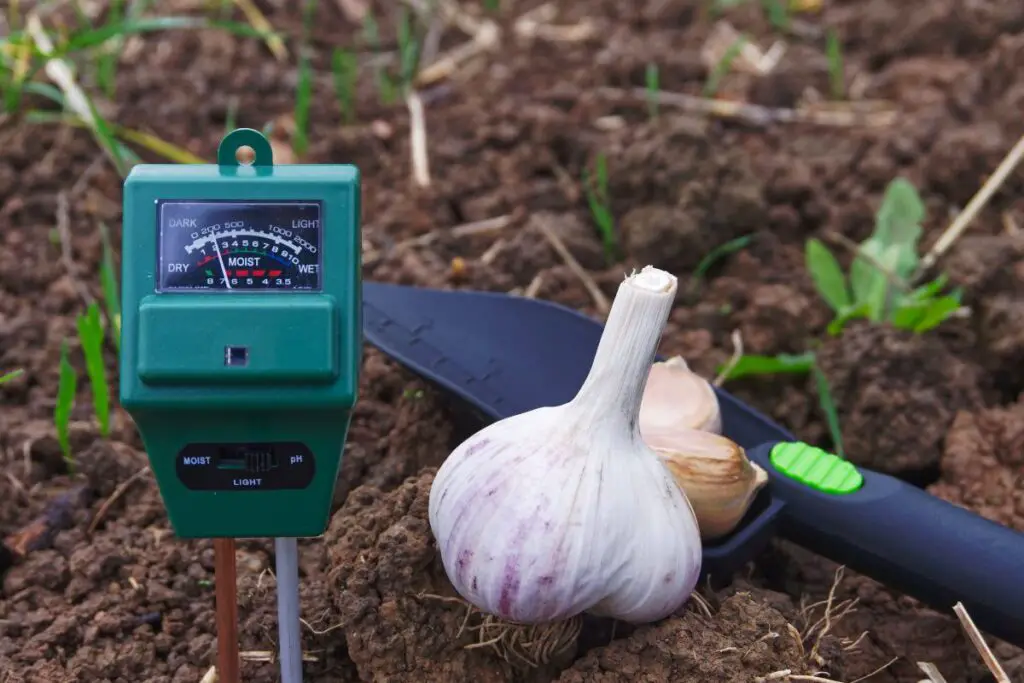
Garlic is quite a hardy vegetable plant.
But in some areas, the weather conditions are so harsh that garlic cannot tolerate it.
Garlic won’t be able to handle harsh weather like hurricanes, thunderstorms with heavy rain, or snowfall.
If your garlic is not sprouting, it could be due to these weird weather conditions.
Sometimes, the winter warms up, so the cloves don’t sprout.
One day, there is snowfall, and the next day, the weather is hot like summer.
The hot weather activates garlic growth, and the cold weather stops them from growing.
This fluctuation confuses the bulbs for which the bulb splits into cloves, and the tender roots tear due to the hard cold.
For these constant interferences, garlic fails to sprout out.
Also read: Garlic Plant Temperature Tolerance: Ideal Temperature+Extreme
Clove has a hole
Cloves having holes is due to wire insects.
Wireworms can destroy all the cloves in winter without letting you know about it.
They will eat them in rows.
So, you will find that some of the rows are missing in the planting bed.
These worms can live up to 3-5 years in their larval stage inside the soil.
Sometimes, people are unaware of the infestation.
They find a clove with a hole and consider it to be a rotten one.
If the cloves are infected with these worms, don’t expect garlic to grow bulbs or sprout.
If your garden has wireworm problems, you should plant hard-shelled garlic cloves like Bogatyr or Siberian.
Cloves are missing
Sometimes the cloves go missing, for which garlic is not seen sprouting.
When you check for them, you won’t find any cloves in that place.
Find rotation signs or mole marks around the planting site.
If you find one, then probably the moles have eaten them.
Cloves are not stored properly
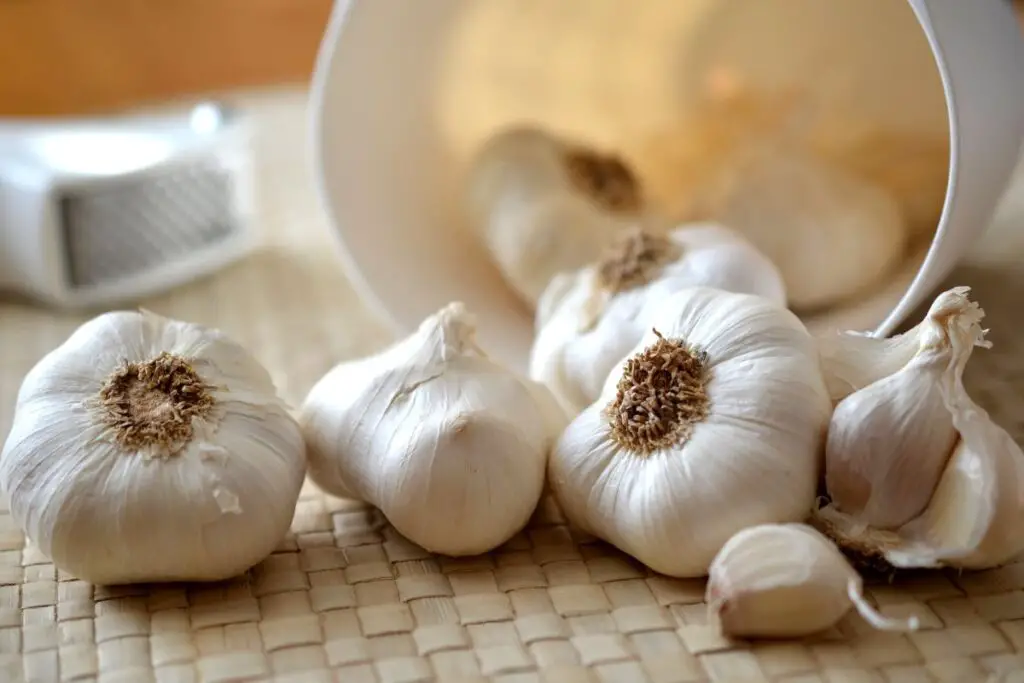
If you have harvested garlic this year and want to plant the cloves from the same garlic in the coming planting season, you must store them well.
Cloves should be cured and cleaned before storage.
Otherwise, you won’t be able to get good bulbs from them after planting.
Let them cure for 2-3 weeks. Then, clean the bulbs.
For storage, please keep them in well-ventilated boxes and maintain a temperature of about 30-50°F and average humidity levels.
The storage should be cool, dark, dry, and away from sunlight.
Diseases
If some disease already infects the cloves, your garlic won’t sprout from the ground.
Suppose a diseased bulb is already present in the ground unknown to you, and you have planted the healthy cloves in that soil.
In that case, the healthy cloves will get infected and won’t be sprouting.
Again, if you plant garlic in the same place, there are chances that the healthy cloves can get infected.
You should plant garlic somewhere else if bugs or diseases have attacked your previous garlic growth.
Crop rotation is necessary to prevent diseases from entering the new and healthy cloves.
Pathogens of some diseases can stay and live in the soil for about 3-10 years.
That is why you must not plant in the same spot again and again.
Consider a crop rotation with a period of 3-6 year cycle.
Also read: Problems With Garlic Plants (Yellow, Brown, Drooping, Bugs, & More)
Other pests
Garlic pests that stay underground can also result in no sprouting of garlic.
Pests like nematodes or wireworms can feed on the garlic cloves and their tissues, for which the cloves will not form any roots and won’t sprout out.
Even if the clove grows roots and the plant comes out, the leaves, stems, and bulbs will get damaged and rotten.
The larvae stay in the seeds, and if you plant those seeds, your garlic will never sprout out of the ground.
You can consider crop rotation.
Soak the seeds or the cloves in warm water for 30 minutes, heated at 100-115°F.
It will kill the pests and even pathogens if present.
While storing the bulbs, maintain a cool temperature with an average humidity level.
Beetles also stay under the ground and feed on the roots.
Due to this, the roots get damaged, and the cloves don’t sprout out. Besides, some bacteria enter and damage the bulbs.
Adding tobacco dust or ash after watering the soil bed can deter underground pests and even kill them.
Make sure the soil is loose and well-aerated and not airtight.
How long does garlic take to sprout out and grow?
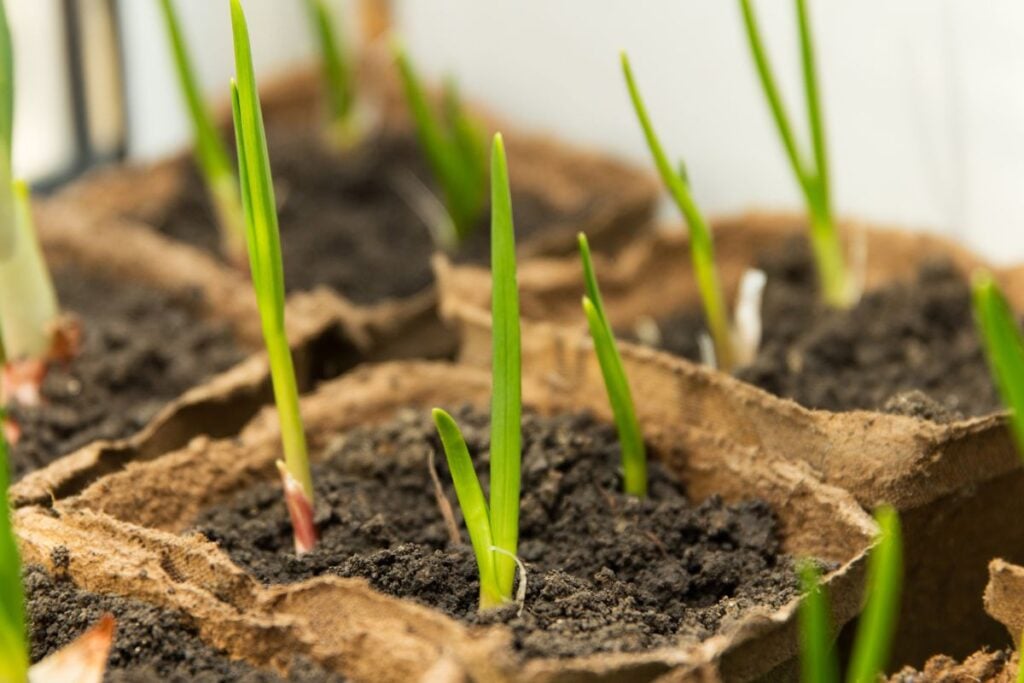
Sometimes, garlic sprouts out at the time of storage.
It is a sign that garlic is going off.
It is getting old, or it is getting too much heat, light, and moisture.
If stored in a refrigerator for a long time, it might sprout within a few months.
Garlic can stay fine for at least 6-8 months if stored in a proper procedure.
After planting, garlic will sprout out of the ground after a couple of weeks.
Garlic will sprout in the coming spring if planted in the late fall.
Garlic takes at least 3-8 months to mature and prepare for harvest.
One cannot say the exact timing because it depends on the planting time.
You can harvest the bulbs in 8 months in spring if they are planted in the fall.
Garlic gets ready for harvest in 3-4 months, in summer or early fall if planted in spring.
Can I plant sprouted garlic?
As mentioned, garlic will sometimes sprout out while stored due to excessive heat, light, and moisture.
So, you might be wondering whether you should plant sprouted garlic or not.
The simple answer is yes.
You can plant the sprouted bulbs.
Planting cloves is the only way to get more garlic bulbs without buying.
You can plant this sprouted garlic and get new bulbs with proper care and maintenance.
The planting steps of sprouted garlic are the same as normal garlic.
However, I will still share the steps, so you don’t have to find them separately.
Also read: When To Plant Garlic Bulbs? (+Seasonal Guide)
Steps for planting sprouted garlic
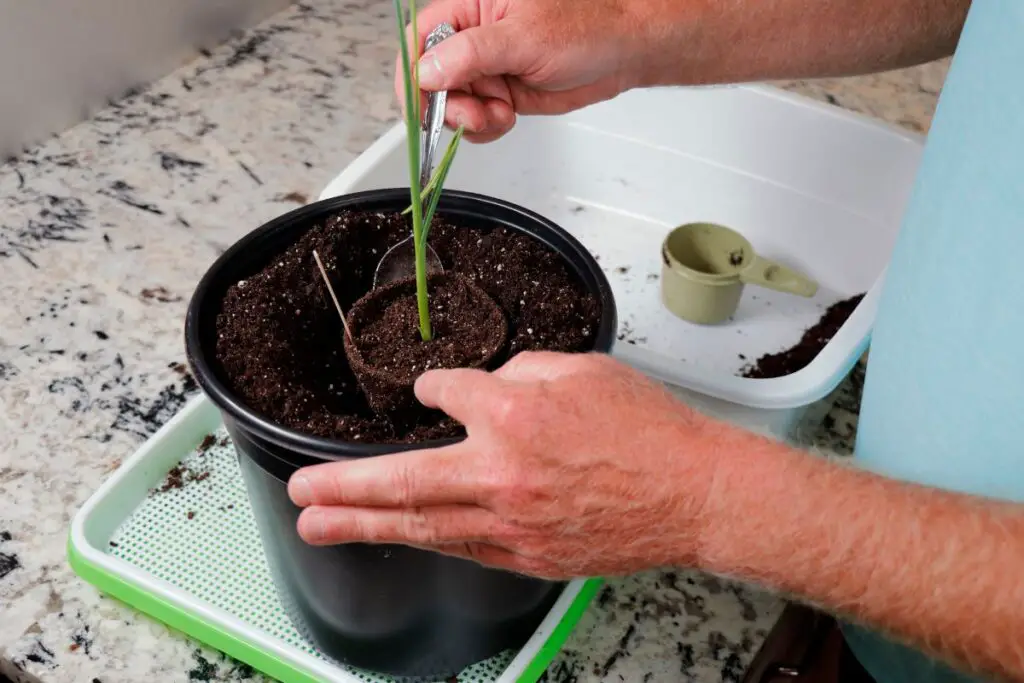
Choose the right time to plant garlic.
The best time is fall, 4-8 weeks before the first frost and ground freezing.
The cloves will get time to develop roots and can also receive the cold during winters for vernalization.
Prepare the soil bed for planting garlic.
The site should be sunny, and the soil must be well-drained, loose, and have a pH level between 6 and 7.
Add some compost and fertilizer to make the soil fertile and more good in quality.
Garlic is a heavy feeder and needs nutritious soil to thrive and make healthy and tasty bulbs.
Now, divide the cloves and keep aside the bigger cloves for planting.
Don’t peel off the papery skin.
Try not to damage the green sprout.
If stored in a dark and dry place and still the bulbs have sprouted, the sprout will be white or yellow.
It will turn bright green after staying under the sunlight.
Push the flat end into the soil and the pointed end upwards.
Plant the cloves 2-4 inches deep and 4-6 inches apart.
Water the bed after planting to keep the soil moist and not wet.
Cover the soil with mulch to retain the moisture and protect the cloves from the coming winter.
When the cloves begin to form bulbs, you can stop fertilizing.
Check the bulb size when the leaves turn dry and brown in the spring.
If they have reached your expected size, stop watering 2-3 weeks before harvesting.
Also read: How Deep And Far Apart Do You Plant Garlic?
Why do people keep the garlic from sprouting?
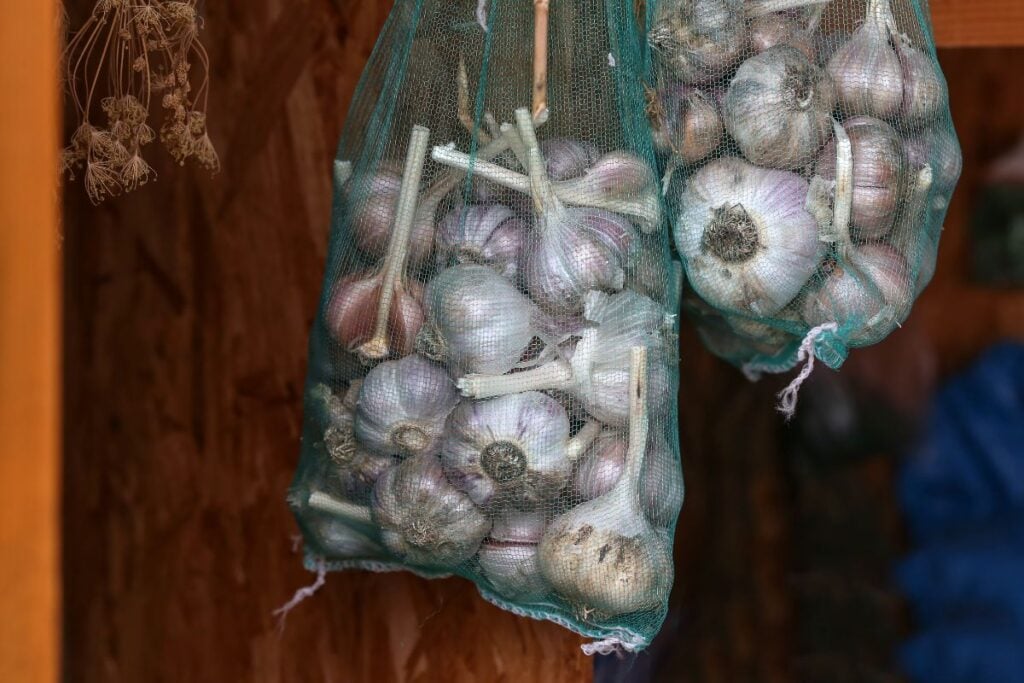
Sometimes people stop the garlic from sprouting.
It is because sprouting symbolizes that garlic is about to go off.
Sprouting means garlic is either getting older or is receiving excessive light, heat, and moisture.
To reduce the chances of garlic sprouting during storage, keep them in a cool, dark, and dry place.
Keep the temperature around 30-50°F and average humidity levels.
Make sure the place does not receive sunlight.
Otherwise, the bulbs will get sunburnt.
Final thoughts
Garlic sprouting is not good if it happens at the time of storage. But garlic not sprouting after planting is something you should worry about.
It could be due to various reasons like weird weather conditions, rotten cloves, holed cloves, garlic not stored well, and disease and pest infestation.
Besides these problems, one reason could be normal: time has not yet arrived for sprouting. Consider checking the bulbs once.
If your cloves have firm roots, don’t worry; they will sprout out. It just requires some time and your patience.
Reference: The Pennsylvania State University, Garlic Production for the Gardener, University of Massachusetts Amherst, Ohio State University Extension.
